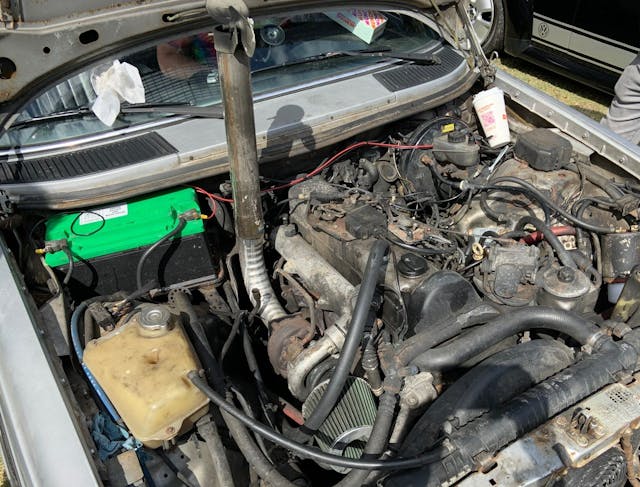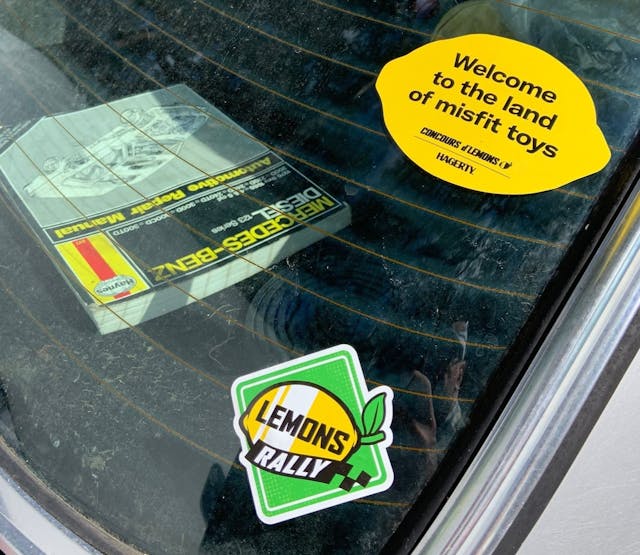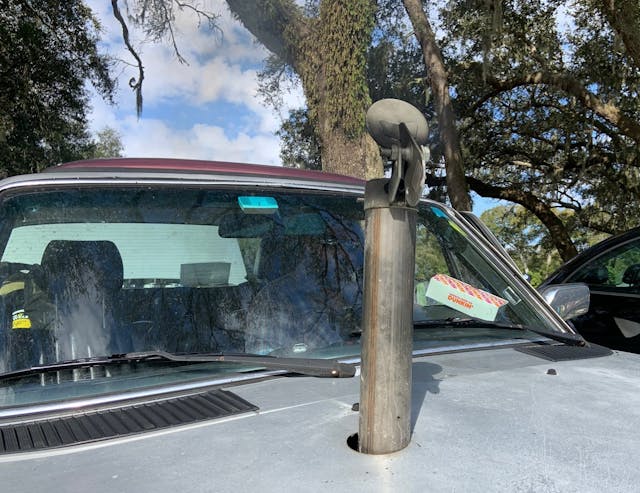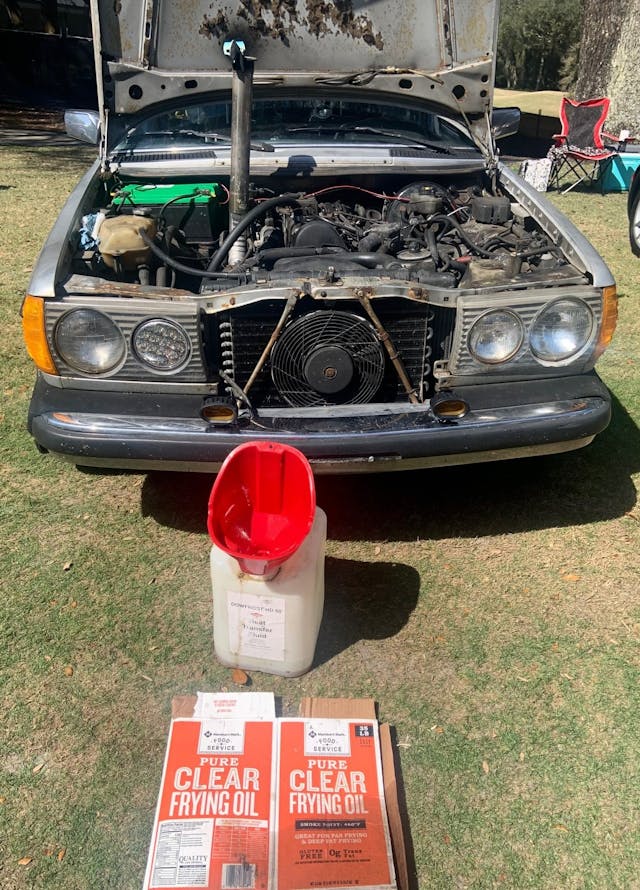Mercedes misfit enriches Lemons with vegetable power
If it smells like French fries and you’re nowhere near a drive-thru, be on the lookout for Ken Oldrid or some other like-minded believer. Ken drives a 1984 Mercedes-Benz 300D Turbo Diesel that looks cooked but nonetheless still comfortably cruises the highway. And it’s fueled by vegetable oil.
Oldrid’s Mercedes stopped us in our tracks, literally, when he fired up its turbodiesel five-cylinder engine at the 2022 Amelia’s Concours d’Lemons. The air was immediately filled with a lipid-rich odor that golden-arch frequenters know all too well. The 300D is equipped with a zero-emissions vegetable oil conversion kit from Greasecar Vegetable Fuel Systems.

“Restaurants just want to get rid of the oil when they’re finished with it, so it’s fairly easy to get some,” says Oldrid, who works for a solar energy company and was joined at Amelia by co-worker/co-driver Joe Kawilik. “They’d rather give it to us than pay for someone to take it away. We’re averaging about 25 miles per gallon—for free.”
Oldrid’s Mercedes is certainly a showstopper, even when it’s not running. It isn’t often you see an exhaust pipe protruding from a hole drilled in the hood of a German luxury sedan. To access the engine, Oldrid or Kawilik simply pull the exhaust pipe loose, open the hood, and then slide it back into position. “Pretty fancy, is it?” Oldrid jokes to those gathered to learn exactly what is going on here.
Oldrid drove the “Vegamite car,” as he calls it, all the way from Rutland, Vermont, to Florida without a single issue. “And we took the long way,” he says. Amelia Island marked the midway point of the 1500-mile Lemons Tour, which started in Alabama.
Oldrid says he became interested in vegetable oil conversion kits while he was in college. “I love cars—but cars are bad for the environment!” he emphasized with a laugh. “So, I thought it was the perfect solution.”

After buying a diesel car and converting it himself, he began doing the same for others under the name Greasy Endeavors. The business is no more, but Oldrid says Greasy Endeavors is now the name of his Lemons team. Oddly enough, until recently he no longer owned a vegetable oil car, and he wanted one to drive on the Lemons Tour, so he searched the web and found the Mercedes listed for sale online in Massachusetts.
“It had been sitting for six years, but I brought it home and then brought it back to life, and she’s running like a champ,” he says. “You can imagine the racket this thing makes when you’re going 80 on the expressway with the sunroof open.”

The Concours d’Lemons judges were impressed. Sort of. “This thing is fantastically horrible,” one of them commented, to which Oldrid immediately replied, “Thank you!”

Like Oldrid, Greasecar Vegetable Fuel Systems founder Justin Carven became interested in biofuels in 1998 while at Hampshire College in Amherst, Massachusetts. He was especially fascinated with the work of Carl Bielenberg, founder of the Better World Workshop, a technology group working in western Africa that had developed a hand-operated seed press for the production of vegetable oil. In addition to the seed press, Bielenberg developed a system for running diesel generators on vegetable oil. What set his invention apart from similar ones was his use of a coolant-heated fuel filter, which allows the vegetable oil to flow freely through the filter element in lower temperatures. Suddenly the invention had worldwide appeal, particularly to farmers living in cooler climates who could run their equipment on oil produced from their own crops.
After Bielenberg returned to the U.S. and converted his Volkswagen Rabbit to vegetable oil power, Carven worked with a team of Hampshire College students to replace a tractor’s engine and do a similar conversion. Inspired by that successful effort, Carven took the idea to the next level and started Greasecar in 2000.

The Greasecar kit is a two-tank fuel system which allows the use of diesel fuel or vegetable oil. As Carven explains on his website, “After start-up, radiator fluid will transfer heat from the engine to the heat exchangers in the Greasecar fuel system. These heat exchangers will heat the vegetable oil in the fuel filter, lines, and fuel tank. The heat will reduce the viscosity of vegetable oil so that it is similar to diesel and can be injected into the engine properly. When the vehicle is being shut down for a period long enough for the fuel to cool, the vegetable oil must be purged from the fuel system and replaced with diesel for the next start up. Purging generally takes around 30 seconds and can be done while driving with the push of the button.”
(Oldrid says the system works so well that he’s even used bacon grease to fuel his car, although since grease solidifies, he had to scoop it with a spoon. “But it’s plenty hot in there, so it melted quickly,” he says.)

Ironically, we only learned about Carven’s company after he’d started winding things down due to a lack of interest. Recently, however, with fuel prices reaching record levels, he is sensing a possible resurgence. He says he’s “evaluating the feasibility of temporarily re-launching the product line,” but that will be contingent on re-sourcing a number of key components, “some of which have now become obsolete.” With that said, he is making inquiries to get what he needs, and it’s possible he could be selling full kits again within a month or so.
Carven says that over the two-decade lifespan of Greasecar, the price of a conversion kit ranged from $800–$3000, depending on the generation of the kit and the specific vehicle application. Based on inflation and lower production volumes, Carven estimates that upon a possible relaunch, “a baseline kit will likely cost around $1500 for automotive applications and $2000 for full-sized pickups.”
“The way things are going,” Oldrid says, “a lot of people may decide it’s worth it.”
The fast-food joints would certainly be on board. Anyone else suddenly craving onion rings?





Hello Jeff Peek. Ken here with the grease car from last year. I am going back to Amelia Island concurs de lemons event again this year with another interesting vehicle. Hoping to see you there!